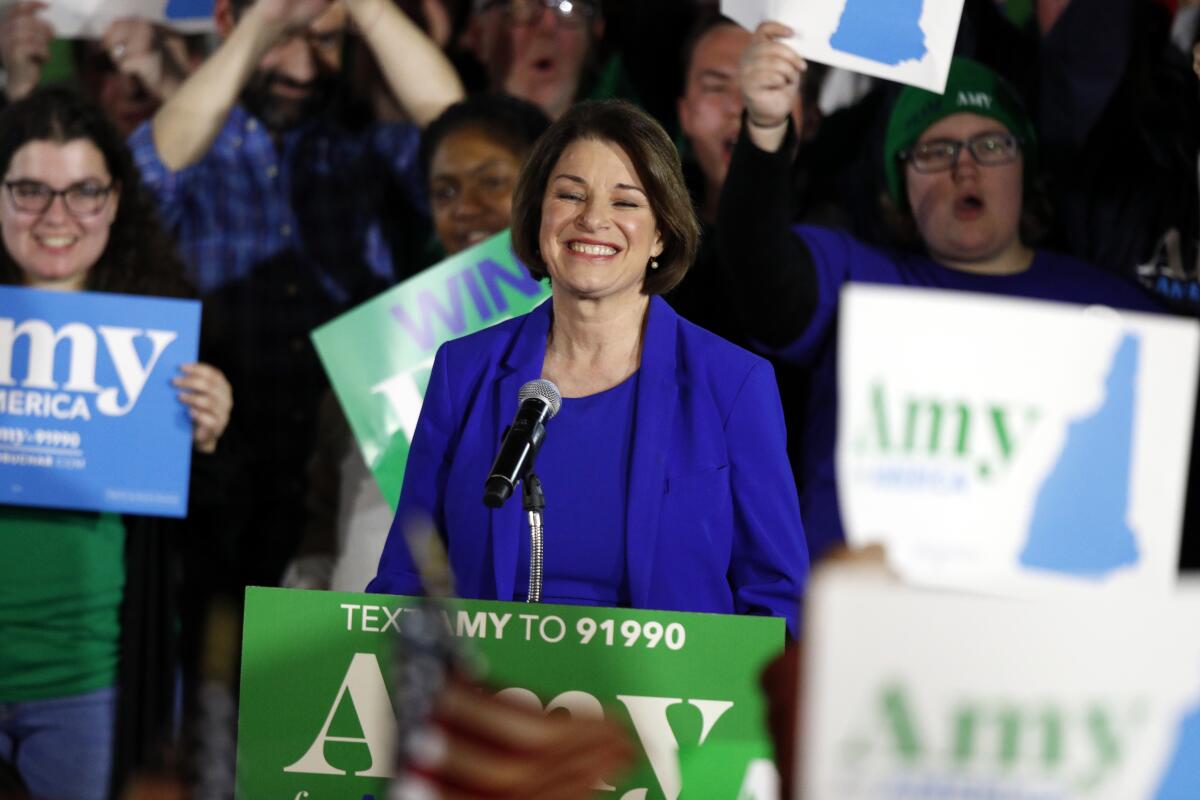Column: Who will be the Un-Bernie?

- Share via
Washington — The Democratic Party establishment — what’s left of it, anyway — is hoping someone can stop Bernie Sanders and his progressive horde from capturing the party’s presidential nomination.
“I don’t know how you win an election [at] 78 years old, screaming in a microphone about the revolution,” said James Carville, a former aide to President Clinton, in an especially pungent expression of the old guard’s anxiety. “It’s like we’re losing our damn minds.”
But Carville and other party elders have two problems as they look for a way to influence the race: They haven’t agreed on which non-Bernie candidate to favor. And even if they did, it’s not clear how many voters would listen.
Sanders has a strong shot at winning for an old-fashioned reason: Even though he’s not the first choice of most Democrats, he’s won more votes than any other candidate.
In Iowa, he essentially tied for first place with Pete Buttigieg. In New Hampshire, he narrowly defeated the 38-year-old former mayor of South Bend, Ind.
If non-Bernie voters continue to scatter their choices, Sanders will consolidate his hold on first place, even if he only wins about a quarter of the votes, which is what he got in Iowa and New Hampshire.
Again, most Democratic voters aren’t Sanders fans or socialists. A CBS News study found a three-way ideological divide: about one third described themselves as “very liberal,” which is Sanders’ base; another third said they were “somewhat liberal,” and the last third called themselves “moderate” or “conservative.” In other words, die-hard progressives are a minority.
So Democratic leaders who are not Sanderistas are hoping next Saturday’s Nevada caucuses and the South Carolina primary a week later will produce a clear surge for one of the candidates they consider more electable: Buttigieg, Amy Klobuchar or Joe Biden.
Klobuchar, who finished a surprising third in New Hampshire, has emerged as their hope-of-the-week: more experienced than Buttigieg, a better campaigner than the flagging Biden.
“She’s smart, she has a strong track record, she’s electable,” argued Elaine Kamarck, another former Clinton aide.
But Klobuchar is still unproven. Her third-place finish in New Hampshire was her best showing so far. In a Nevada poll last week, she tied Buttigieg for fifth place with 10%.
In New Hampshire, Klobuchar was boosted by a strong performance in the final debate. A lot may hang on whether she performs as well at the next debate in Las Vegas on Wednesday.
That may also be the first debate to include Michael R. Bloomberg, the former mayor of New York who has spent more than $200 million to elbow his way into the competition.
Bloomberg will be on ballots beginning on March 3 — Super Tuesday — when 14 states including California hold primaries that will choose more than a third of the elected delegates to the Democrats’ convention.
And that opens the way to a prospect that gives establishment Democrats nightmares: a split for the un-Bernie vote among Bloomberg, Klobuchar, Buttigieg — plus, if they manage to stay alive, Biden and Elizabeth Warren.
Berniecrats are already worried that the establishment is plotting to stop him, as they believe it did in 2016. They’ve complained that the Democratic National Committee unfairly changed the debate rules to help Bloomberg.
But it’s not clear that the establishment is capable of intervening effectively.
A generation ago, party leaders could tip the scales by endorsing a favorite candidate. If former President Obama threw his support to Biden, Buttigieg or Klobuchar, that might sway some votes — although of course, Obama’s support wasn’t enough to elect Hillary Clinton in 2016.
Endorsements don’t count as much as they once did. Voters who once relied on politicians for advice now have direct access to information — and disinformation — through the internet.
The other traditional avenue of influence was fundraising: Big donors could make one or two candidates viable, and starve others of resources.
But that’s changed, too. Sanders has raised more than $121 million almost entirely from small-dollar donors. Bloomberg isn’t asking anyone for money at all.
Besides, party leaders are reluctant to intervene in a way that would alienate Sanders supporters, since their votes will be crucial in November even if he’s not the nominee.
“They seem to know they don’t want Sanders, but they can’t do much about it,” said Hans Noel, a political scientist at Georgetown University who studies the role of parties in the nominating process.
Still, there’s one last, unusual scenario under which party leaders could exert some influence: delegate-swapping.
If no one amasses a majority of delegates during the primaries, several candidates could try to cut bargains before the Democratic convention in Milwaukee in mid-July.
For example, a candidate in third or fourth place could drop out and release his or her delegates, which would free them to vote for anyone else.
If there’s no winner on the first ballot, the party’s “superdelegates” — mostly elected officials and party activists — get to join in later voting. The DNC adopted those rules in 2018 in a compromise that Sanders approved.
So the establishment might make its voice heard after all.
But those hypothetical plot twists are months away. Until then, the choice is out of the establishment’s control and up to the voters. Like it or not, the Democrats are going to have to solve their problem through democracy.
More to Read
Get the L.A. Times Politics newsletter
Deeply reported insights into legislation, politics and policy from Sacramento, Washington and beyond. In your inbox three times per week.
You may occasionally receive promotional content from the Los Angeles Times.









